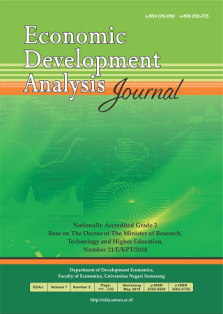The Impact of Renewable Energy and Education on G-20 Environmental Degradation
Abstract
The efforts of the G-20 for sustainable development continue to be pursued in order to improve human welfare while reducing pressure on ecological resources. The ecological footprint is used as a more comprehensive measure that can see the pressure on the environment that comes from human activities. Using panel data from 19 G-20 countries from 1992 to 2018, this study aims to analyze the dynamic linkages of economic growth, use of renewable energy and level of education to the ecological footprint of the G20 countries. This study uses the PMG-ARDL analysis method to see the dynamic relationship between variables and makes it possible to see cointegration or long-term relationships. The estimation results show that in the long run an increase in per capita income will follow the EKC hypothesis. However, the educational attainment of the increase in the average length of schooling of the G-20 countries does not follow the EKC hypothesis and has not been able to directly reduce the ecological footprint. The higher the education level of a person can put higher pressure on the environment. However, education will indirectly make an increase in the level of income to be able to get to the turning point so that an increase in income can have the possibility of reducing pressure on the environment. This shows that the level of education can make the stability of environmental conditions return to a state of balance more quickly if there is a disturbance or shock to the condition of environmental balance.


